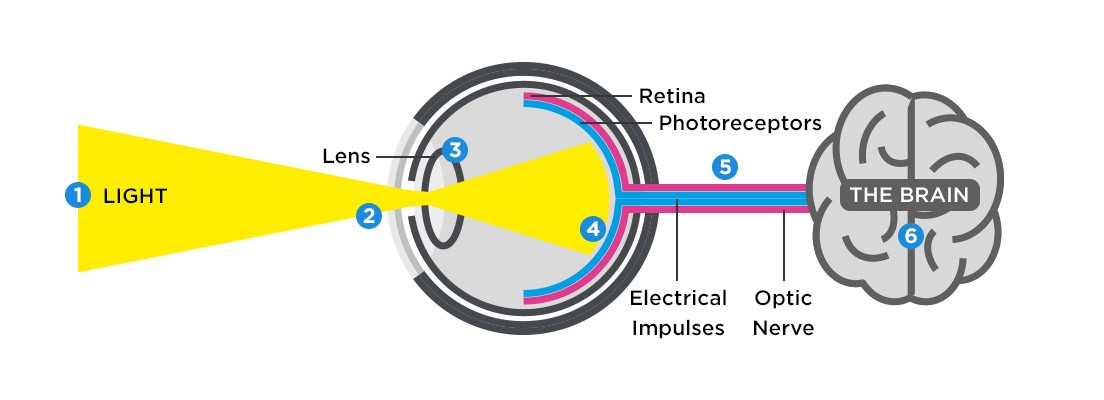“No one, when he has lit a lamp, puts it in a secret place or under a basket, but on a lampstand, that those who come in may see the light. The lamp of the body is the eye. Therefore, when your eye is good, your whole body also is full of light. But when your eye is bad, your body is also full of darkness. If then your whole body is full of light, having no part dark, the whole body will be full of light, as when the bright shining of a lamp gives you light”
The eye is a magnificent member of the body in which our Lord allows us to observe His wonderful creation. The eye is what brings light into the body and it is the member of the body that receives light. Mechanistically, the eye must be able to function in order to receive light. There can be light present, but if the eye is not operating properly, it will by no means receive light. Thus, the eye will not be able to transmit light into the body.
In the diagram shown below, light is entering through the lens, resting in the center of the eye, in which the retina receives that light and converts the light into an electrical impulse that travels to the brain.

Therefore, unless that light comes into the eye initially, and the eye is functional to receive the light, that light will not enter and enrich our bodies. This anatomic example is exactly similar to receiving the light of our Beloved Christ within us.
The eyes of our body are the receivers of light. Though they are the lamp of the body and the light of the body, they are absolutely not the source of light. They can only receive light and transmit it into the body. Therefore, there are two requirements for the body to receive light:
- The eye must be functional
- There must be an external source of light
We can simply ask ourselves, what is the external source of light? St. Cyril of Alexandria interprets that light, as our Savior Jesus Christ. He states, “And let us consider the inference which follows from this. Before then the coming of our Savior, the father of darkness, even Satan, had made the world dark, and blackened all things with an intellectual gloom; but in this state the Father gave us the Son, to be as it were a lamp to the world, to irradiate us with divine light, and rescue us from Satanic darkness.”
Not only is Christ the true light, but He is also the very source of light that is essential to our being which illuminates it from satanic darkness.
Christ is that ever shining lamp in the midst of spiritual darkness, and our eyes will never see light until we look at Him. If we gaze unto anything else besides our Beloved Lord, we look unto darkness. In order for our eyes to see Christ, and have His light pass into our bodies and to purify our whole being, our spiritual eyes must be functional.
“Therefore, when your eye is good, your whole body also is full of light. But when your eye is bad, your body is also full of darkness.”
The word good in this verse in Greek is ἁπλοῦς (haplous), meaning single or whole; having no ulterior motive. The primary occupation of the eye is to receive light. When the eye is not primarily occupied with receiving light, we would be blind! Our Lord is emphasizing that when the eye is good; when it is whole; when it is simply focused on its task, the eye will be able to receive light and transmit it to our bodies. Christ then expands and states, “When your eye is bad, your body is also full of darkness.” The word bad in this verse in Greek is πονηρὸς (pon-Eros), meaning diseased. Therefore, when the eye is diseased, it will never be able to transmit light to the body. If our spiritual eyes are diseased, and corrupted with the vanities of the present age the light of Christ will by no means purify us from our infirmities.
As one can imagine, being exposed to light is of extreme importance to the operation of our eye. If an infant is robbed from seeing light, they will ultimately lose the functionality of their eyes, and lose their sight permanently. If one is immersed in darkness for long periods of time, the eyes will attempt to adapt to the darkness by dilating in order to receive light from anything. Interestingly, if the eye is unable to capture any sense of light while being in this darkness, the brain will eventually hallucinate and imagine figures in the darkness that are not present, reaching to a point of where an individual can no longer trust their eyes. This is seen in criminals who are sentenced to sensory deprived jail cells. Eventually, because of the lack of light, the eyes will atrophy and die, leaving the individual blind. Thus in order to have a healthy pair of eyes, they must be exposed to light.
The aforementioned scenarios are very similar to our spiritual lives. Christ plainly states that if our eyes are diseased, we must “take heed that the light that is in us is not darkness” because the more we cease to fixate our eyes on the light of Christ, we will be full of darkness and begin to spiritually hallucinate. Meaning that our sense of discernment will be flawed. We will not adhere to the commandments of our Lord. We will become spiritually irrational; judging inaccurately the things we observe. We will judge our brothers and sisters with hate. We will lack love, faith, and humility. More importantly, we will not understand the meaning of truly walking in the light of Christ. We will assume we are walking in accordance of what we think is true while it is in actuality, completely flawed. We will become hypocrites, darkened by our blindness, just as the Pharisees were. It will be said of us, “Son of man, you dwell in the midst of a rebellious house, which has eyes to see but does not see, and ears to hear but does not hear.” (Ezekiel 12:2). We will pride ourselves on our faith, while leading a corrupt life. We must take heed the voice of St. John Chrysostom, understanding that, “correct faith does not benefit in anything, when life is corrupted.” Therefore, when we deprive our eyes of the light of Christ, our eyes will become diseased not focusing on the beauty of holiness.
The light of Christ is ever-present, which means the true problem lies within us, and not with the world around us. Our eyes are diseased, and fixated on the darkness of the pleasures of the forever-passing world. Let us take an example of nature. A bee will always be attracted to beautiful flowers, while a fly will be attracted to rubbish. This is the same with individuals. The way we look at the world can determine whether or not the light of God is within us. One who is full of hate and anger with a diseased eye will look at the world and will always be continually focused on the negatives of everything and everyone. Someone who is insecure is threatened by everyone, yet someone who is secure is threatened by no one. Observe how a criminal is far more suspicious, than one who is honest. If I begin to see the sins of others, let it be known that this is a symptom that darkness is near and that our eyes are diseased. Individuals, who have the light of Christ in them, will only see the good in others. They will look to them with the same tenderness and kindness that Christ looks to us.
If we do not quickly fixate our eyes on Christ, let us know that we may begin to hallucinate as a criminal who is put in a sensory deprivation jail cell, and begin to see evil when evil is not truly there. Therefore, let us continually look at Christ just as those who were bitten by a serpent looked at the bronze serpent of Moses, and lived. Let us gaze upon Our Beloved Christ, so that He may purify our eyes that we may allow the light of Christ to fill our entire being so that we may begin walking in the light.
“Grant me, O Lord, the remedy of conversion, that I might be healed of all the evil that is in me. Grant that I might enter the realm of restraint. Grant that I might spend all the days of my life in contrition of heart. Enlighten the clouded eyes of my mind, that I might rush zealously to embark on the path that leads to Thy vineyard” (St. Ephraim the Syrian).


